The extracts here have been reproduced verbatim, including punctuation ([?] indicates unclear).
JULIA’S DESCRIPTION OF THEODORE AND HIS ARRIVAL IN BURNHAM:
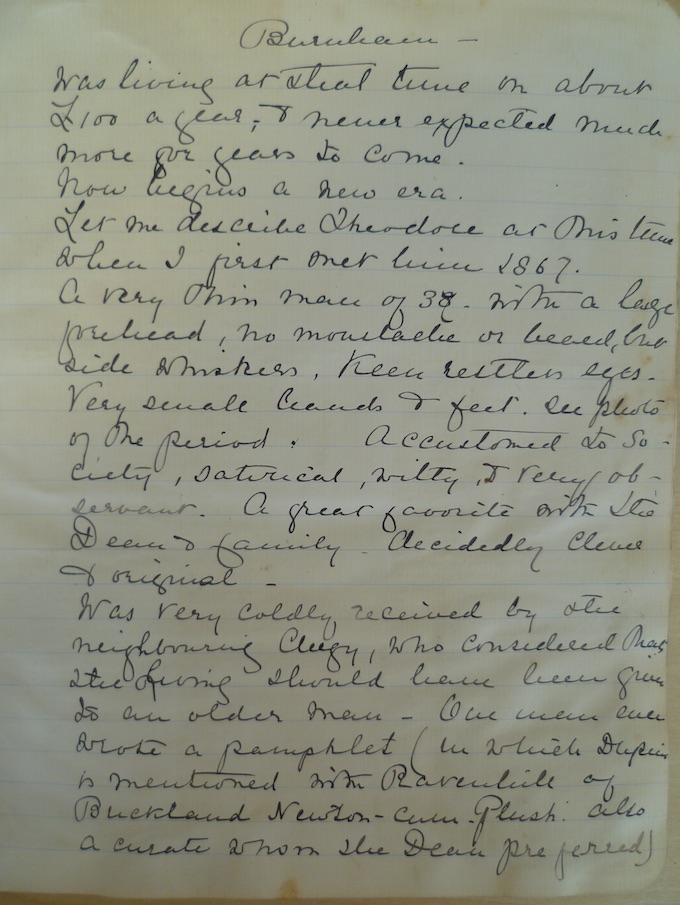
QUEEN EMMA OF HAWAII:
This extract , recalling 1865, was evidently written in 1902 and includes a mention of what may have been the Dupuis’ first visits to Burnham.
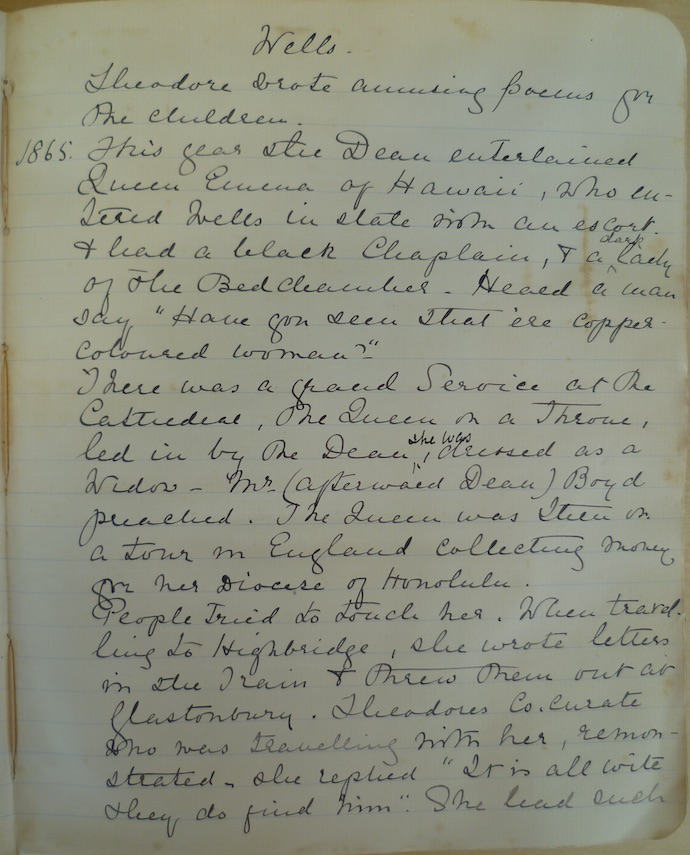
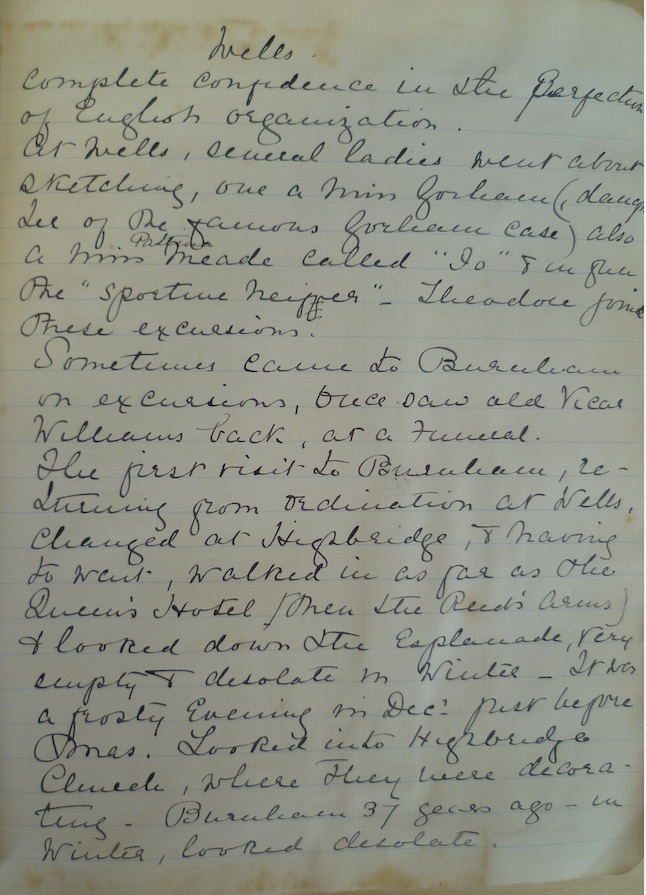
1865
This year the Dean entertained Queen Emma of Hawaii, who entered Wells in state with an escort & had a black Chaplain and a dark lady of the Bedchamber. Heard a man say “Have you seen that ‘ere copper-coloured woman?”
There was a grand Service at the Cathedral, the Queen on a throne, led in by the dean, she was dressed as a widow – Mr (afterward Dean) Boyd preached. The Queen was then on a tour of England collecting money for her Diocese of Honolulu.
People tried to touch her. When travelling to Highbridge, she wrote letters in the train & threw them out at Glastonbury. Theodore’s Co-Curate, who was travelling with her, remonstrated – she replied “It is all wite [sic] they do find him.” She had such complete confidence in the perfection of English organization.
At Wells several ladies went about sketching……….Theodore joined these excursions.
Sometimes came to Burnham on excursions, once saw old Vicar Williams back, at a funeral. The first visit to Burnham, returning from ordination at Wells, changed at Highbridge, & having to wait, walked in as far as the Queen’s Hotel (then the Reed’s Arms) & looked down the Esplanade, very empty and desolate in Winter. It was a frosty evening in Dec. just before Xmas. Looked into Highbridge Church, where they were decorating. Burnham 37 years ago – in Winter, looked desolate.
[Extract from Wikipedia:
Emma Kalanikaumakaʻamano Kaleleonālani Naʻea Rooke was born on January 2, 1836, in Honolulu and was often called Emalani (“royal Emma”). Her father was High Chief George Naʻea and her mother was High Chief Fanny Kekelaokalani Young. She was adopted under Hawaiian tradition by her childless maternal aunt, chiefess Grace Kamaʻikuʻi Young Rooke, and her husband, English physician Dr. Thomas C. B. Rooke.
Emma was educated at the Royal School, which was established by American missionaries, and was cross-cultural in her outlook. She was queen of Hawaii as the wife of King Kamehameha IV from 1856 to his death in 1863. She was later a candidate for the throne but King Kalākaua was elected instead.
In 1860, Queen Emma and King Kamehameha IV petitioned the Church of England to help establish the Church of Hawaii. Upon the arrival of Anglican bishop Thomas Nettleship Staley and two priests, they both were baptized on October 21, 1862. With her husband, she championed the Anglican (Episcopal) church in Hawaii and founded St. Andrew’s Cathedral, raising funds for the building. In 1867 she founded Saint Andrew’s Priory School for Girls. She also laid the groundwork for an Episcopal secondary school for boys originally named for Saint Alban.
From 1865 to 1866, Queen Emma traveled to England, Europe and the United States, for her health and to help the burgeoning Anglican mission in Hawaii. In her time in Europe, she met with Queen Victoria and Emperor Napoleon III, among others. In the U.S. she was given a reception by President Andrew Johnson.]
PEOPLE OF BURNHAM:
Some of the entries describing the time around the Dupuis family taking up residence in Burnham in the late 1860’s are about local people:
“Burnham was then a small town with a population of 1700 – (?) Julia Terrace being then a carcase. Except in the season (summer) the place was a desert. The principal people here then – were – Mr & Mrs Thwaites at The Grove (now Hart House College) whose son Rev Graham Thwaites is still a friend of ours, &. who stayed here this Spring 97). The John Boards, Dunstan House, Theodore’s principal supporters – Their daughter May subsequently became a great friend of the Dupuis family, a constant helper in the Parish & Dora’s Godmother. Some of the other Burnham inhabitants then the Chadwicks, Brices, Gunters, Phelps, Estlins. Dr Morris ( father of Florence Bliss saunders)…..John Allen…..The Ritsons (Mrs Railton a daughter). Miss Alice Dodd, a dear old lady. Mrs Walter Board was the first person to call on Theodore & a faithful friend & helper until her death in 95…..George Reed was the squire (a tablet to his daughter in the Church). His grand daughter Juliana (now Mrs Gaskell). Mr Saunders, an eccentric man built Ellen’s Cottages in 68 & widowed then in memory of his wife. (His daughter Mrs Armstrong now lives at St Anns House). At The Colony lived Briscoe & Estlin.”
It was not only the upper classes that got a mention, a number of ‘ordinary’ people and tradespeople also featured:
“The National School then consisted of the principal room, & the little Class room, the master was Jones, a good simple plain man….One old woman, called ‘The Witch’ of Burnham was Mrs Winter, who was supposed to ‘overlook’ people. Another character was old Jenny [?]Young. Benjamin Butt was a remarkable instance of a saintly peasant. His wife [?]Pelina was a character. Another old woman was Hannah Moore. Mr James Hembry a good old farmer….Old Avent, Henry, Edwin King were grocers and linendrapers. & old Tucker. Mr & Miss Stuckey Confectioners – old [?]James a Chemist, afterwards crazy. Old Mr Hobs, a lawyer & orator of the Town, he lived to a great age.”
The reference to the witch is particularly interesting in connection with a report which appeared in the Bath Chronicle on 5th June 1862:
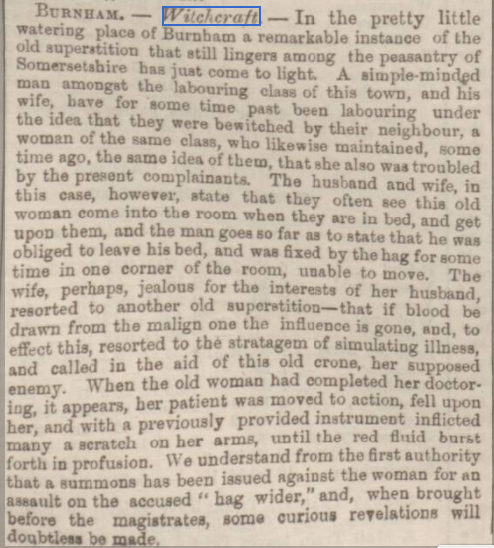
“1868 Theodore’s first Housekeeper was old Mrs Nicholls, who stayed some years with him, & to whom Theodore gave one of Ellen’s Cottages where she ended her days. Had cronies, her chief one Jane Croker. Henry Luke was gardener & lived in Vicarage – afterwards [????] away to the Police. Someone wrote on the organ which he used to blow “H.L. is gone to Glastonbury to be a bobby”. Jane Croker’s tipsy Husband used to fetch her, saying “I want my Jane.” He used to bite off dogs tails for a shilling each.”
ESPLANADE SHELTER CONTROVERSY 1890’s:
Plans for a shelter and seating on the Esplanade side of the land which later became Marine Cove were being discussed in the 1890’s
The clippings below were saved by Mrs Dupuis.
Local Board meeting:
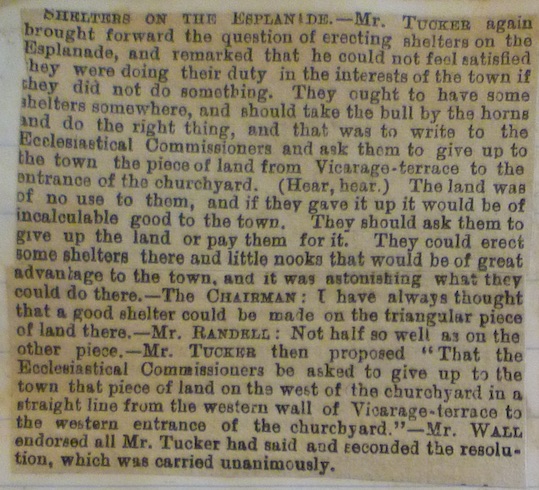
Opinion Piece:
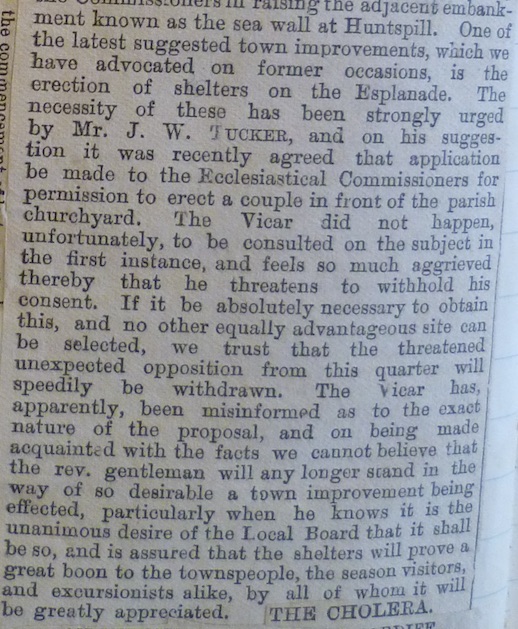
Mrs Dupuis recorded in in the diaries:
“This year there was a great unpleasantness made by fussy impudent John Tucker – who coveted the Vicarage sea frontage to make vulgar shelters. This never came to pass – Tucker had previously been a friendly and useful trades-man – but his head became [????? ] & for some years he was a nuisance, in the busybody line, especially later on in the National School Rows.“
THE SHAKESPEARE CLUB
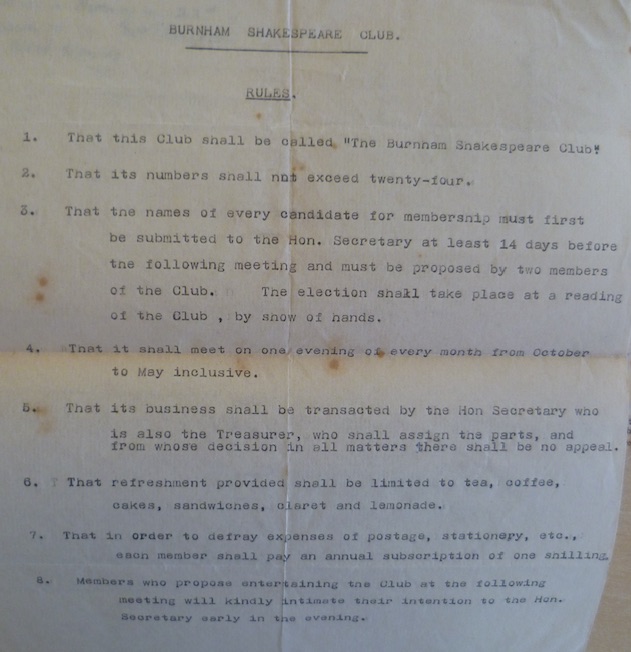
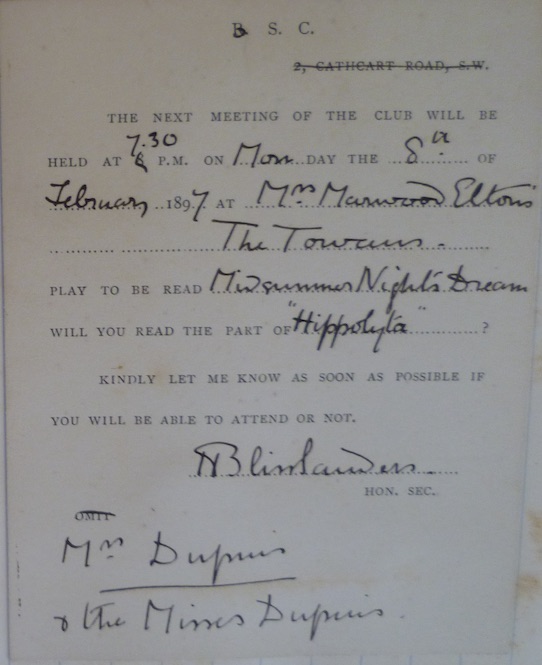
Mrs Dupuis recorded :
“The Shakespeare Parties continued through the Winter but at the one held by the Hills in Xmas week there was a dreadful occurrence which led to much trouble – One of the ladies – a spinster being scarcely able to read, through what she called illness – some of the other members suspected her of drunkenness.”
Further extracts about St Andrew’s Church here and about the National School here.
